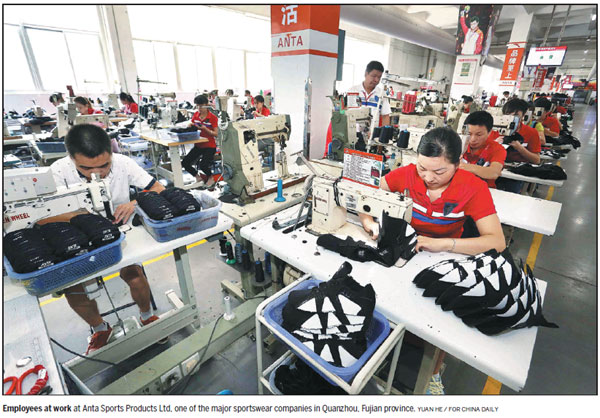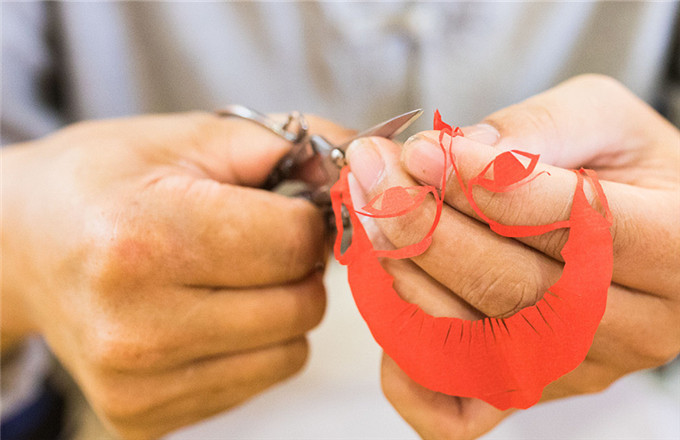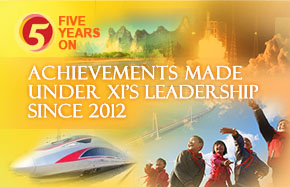Sportswear companies look to lead the field

Producers of sports clothing and accessories in East China are adopting new technology in a bid to overtake competitors around the world, as An Baijie and Li Xiaokun report from Quanzhou, Fujian.
When President Xi Jinping and Finnish President Sauli Niinisto met with athletes from the two nations at the 2017 World Figure Skating Championships in Helsinki in April, Xi brought a gift for Niinisto and his wife Jenni Haukio - a piece of sportswear bearing the Chinese athletes' autographs.
The sportswear, produced by Anta Sports Products Ltd, was made in Jinjiang, which is administered by Quanzhou, a city in the eastern province of Fujian.
The market capitalization of the company, which went public in 1997, recently exceeded HK$70 billion ($9 billion), nearly six times its initial market value.

Ding Shizhong, Anta's chairman and CEO, said the company has set two development goals to be realized by 2020: selling 100 million pairs of shoes and 130 million items of clothing, and expanding the number of stores it operates to 11,000.
Last year, Anta established a joint venture with Descente, a Japanese company that makes winter sports gear, with a plan to open 10 stores in China to promote high-end outdoor sports clothing and accessories. According to Ding, the company is looking to move into the high-end market via mergers and acquisitions.
Jinjiang is the world's largest production base for sneakers, with 404 large-scale enterprises producing 1 billion pairs a year.
As a result of rising labor costs, shoemakers in Jinjiang have been scrambling to grab the high-end market.
To promote their brands internationally, large footwear companies in the city, including Anta and 361 Degrees, have signed NBA stars such as Kevin Garnett and Klay Thompson, plus a number of Jamaican athletes.
The transformation from low-price manufacturer to premium brand is not easy. In addition to increased costs for labor and raw materials, such as rubber and petroleum products, the end of last year saw the exported goods price index for footwear products fall by 10 percent from 2015.
Moreover, the foreign trade climate index for the footwear industry fell by 24 percent during the same period, according to the Jinjiang bureau of commerce.
Cai Wenqing, head of the bureau, said many companies adopted similar strategies - investing larger sums in research and development - to insulate themselves from the impact of rising costs.
"Transformation takes time, but with this active response we will be on the right track soon," he said.
Intelligent factories
Su Yashuai, founder and board chairman of J-TECH CNC Technology, said that in the past 20 years he has witnessed impressive changes in his hometown and his company. J-TECH has grown from a small factory producing hardware fittings and molds to a large business specializing in the production of precision-machining equipment through the use of automation and intelligent manufacturing techniques.
The company, whose products cover industries such as aerospace, defense, automobiles, shipbuilding, wind power generation and medical equipment, now holds more than 100 patents.
"We once had a competition with a Japanese peer. The performance and precision of our products were as good as theirs, even though our brand wasn't as famous," Su said, displaying one of his company's latest products, a machine that makes shells for mobile phones.
J-TECH is just one example of how businesses in Quanzhou have undergone complete makeovers. As the city has intensified its reform efforts, more companies have been motivated to embrace change.
Last year, Quanzhou was listed as a pilot city for the Made in China 2025 program, a 10-year plan unveiled by the State Council, China's Cabinet, in 2015. The program aims to transform the country from a manufacturing giant into a global manufacturing power, and is the first action plan specifically designed to achieve that ambition.
In response, the city launched the Made in Quanzhou 2025 initiative, under which traditional industries are being upgraded to technology-based businesses.
The results are obvious. More than 40 percent of the city's large industrial enterprises use machines that employ computer numerical control, allowing them to operate via programmed sequences, and smart robots. The moves have cut the labor force by 30 percent and lowered costs by 50 percent. In addition, a host of imported equipment has been replaced with Chinese-made machinery, shortening production times by as much as 40 percent.
Quanzhou, once home to a number of small and medium-sized private companies, is now filled with innovation-driven and high technology-oriented industrial clusters. As a result, it is bursting with vitality and is one of three pillar cities in the province. The others are Fuzhou, the provincial capital, and the port city of Xiamen, which will host the ninth BRICS Summit in September.
Room for development
For the past 18 years, Quanzhou has had the highest GDP of any city in Fujian, according to official statistics, but the authorities are not sitting on their laurels.
"There's still plenty of room for development," said Chen Jianxing, deputy director of the city's science and technology bureau.
He added that private enterprises face many challenges in common, such as small scales of operation, allied to a lack of research investment and high-caliber personnel.
To overcome these difficulties, the municipal government has invited experts from scientific institutions nationwide to study the problems and formulate solutions in accordance with local conditions.
Private companies are also being encouraged to cooperate with renowned universities to harness the most advanced ideas and experience from around the country.
Zhuang Xiashui, director of the human resources department of food producer Dali Group, which is based in Quanzhou, said the company upgrades and streamlines its production line every year to raise output and production capacity.
In recent years, about 3 percent of the company's sales income has been spent on innovation and upgrading the company's technology, he said.
Xinhua and Lu Yan contributed to this story.



























